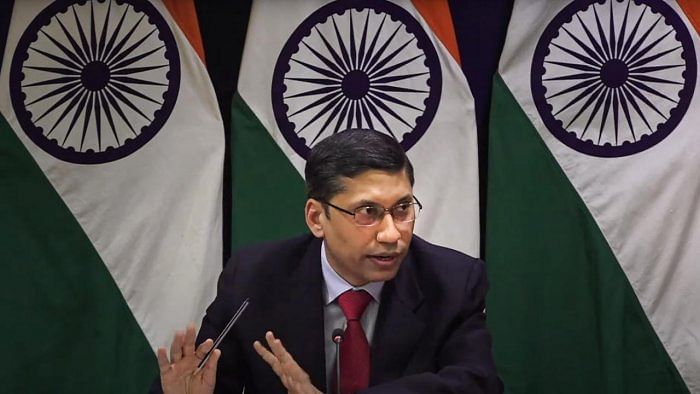
External Affairs Ministry spokesperson Arindam Bagchi.
Credit: PTI Photo
New Delhi: India has rejected Canada’s allegation that its move to ensure parity in the diplomatic presence of the two nations in each other’s capital was “a violation of international norms”.
“The state of our bilateral relations, the much higher number of Canadian diplomats in India, and their continued interference in our internal affairs warrant a parity in mutual diplomatic presence in New Delhi and Ottawa,” Arindam Bagchi, the spokesperson of the Ministry of External Affairs, said in New Delhi. “We reject any attempt to portray the implementation of parity as a violation of international norms.”
A source said that parity had been sought in the diplomatic representations at the missions of Canada and India in New Delhi and Ottawa only. “There is no impact on Canadian diplomatic strength in their consulates in Bengaluru, Mumbai and Chandigarh. The Canadian decision to cease operations of their three consulates in India is unilateral, and not related to the implementation of parity,” added the source in New Delhi.
The relations between the two nations hit a new low over Ottawa’s allegation about India’s involvement in the killing of Khalistani Sikh extremist, Hardeep Singh Nijjar, in Canada. New Delhi asked Ottawa to withdraw two-thirds of its diplomats from India. The move was intended to bring parity between the number of India’s diplomats in Canada and that of Canada’s in India.
Ottawa accepted New Delhi’s demand for the withdrawal of 41 of the 62 diplomats of Canada in India. It, however, alleged that New Delhi’s move to press Canada to downsize its diplomatic missions in India was contrary to international law, including the Vienna Convention on Diplomatic Relations.
“We have been engaged with the Canadian side on this over the last month in order to work out the details and modalities of its implementation,” said the MEA spokesperson, adding: “Our actions in implementing this parity are fully consistent with Article 11.1 of the Vienna Convention on Diplomatic Relations”.
According to Article 11.1 of the Vienna Convention, in the absence of specific agreement as to the size of the mission, the receiving state may require that the size of a mission be kept within limits considered by it to be reasonable and normal, having regard to circumstances and conditions in the receiving state and to the needs of the particular mission.
India’s decision to seek parity was conveyed to Canada around one month ago, with the target implementation date being October 10. The deadline was extended till October 20 as details and modalities of implementation, including the list of Canadian diplomats who would continue to be accorded diplomatic immunities and privileges were being worked out in consultation with the Canadian side. “Attempts by Canada to portray this as an "arbitrary" and overnight decision are factually inaccurate,” said the source in New Delhi.
New Delhi also pointed out that Canada's domestic legislation itself provided for comparable treatment of foreign diplomats in Canada to what its own diplomats get in a foreign country, as well as withdrawal of any of their diplomatic privileges and immunities.
